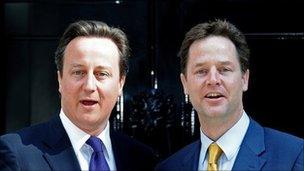Cameron and Clegg target youth unemployment 'scandal'
- Published

David Cameron and Nick Clegg walked into Downing Street together a year ago
A plan to "reverse the trend of rising youth unemployment" has been launched by David Cameron and Nick Clegg.
The prime minister and his deputy announced a £60m package to create apprenticeships and work placements in private firms.
The government says unemployment levels among young people are a "scandal".
Labour said the package was "inadequate" and the real problem was a lack of economic growth and jobs for young people.
Mr Cameron and Mr Clegg appeared together in London to launch the initiative, as the coalition government seeks to move on from last week's poor election performance by the Lib Dems - which has seen the deputy PM put under pressure to wield more clout in government.
Mr Clegg has said the Lib Dems are "clearly influencing" their Conservative partners - but Mr Cameron says it is not the role of one party to "moderate the other".
On Wednesday, a key coalition policy, to introduce directly elected police commissioners in England and Wales, was unexpectedly blocked in the House of Lords - following an amendment by Lib Dem peers.
Intensive support
Addressing the event on Thursday, Mr Clegg said government could not "wave a magic wand" to create jobs, but it could "intervene at critical points" in order to help out.
In the first instance, he said the Supporting Youth Employment initiative would place 10,000 16 to 24-year olds into apprenticeships.
He said there would also be a pilot, beginning now and involving 50,000 youngsters over two years, to provide six-week intensive periods of support - help with training, childcare and presentation skills - with a guaranteed job interview at the end.
In total, the initiative will provide funding for 250,000 apprenticeships over the next four years and 100,000 work placements over the next two years.
But, speaking directly to business leaders in the audience, Mr Cameron said government could only do so much, adding: "In the end, we know that it is businesses that create jobs and opportunity, so we're committed to work with you.
"You tell us what you need and we'll give you the tools to get it done."
Work and Pensions Secretary Iain Duncan Smith said the plan would "address the scandal of the highest level of youth unemployment the UK has seen in modern times".
The coalition government has attracted criticism for scrapping the £1bn Future Jobs Fund - a scheme set up by the previous Labour government to help mainly young unemployed people back to work.
But Mr Duncan Smith told the BBC youth unemployment had reached record levels despite Labour "throwing money" at the problem, and what really mattered was not the amount spent, but where it was targeted.
"The Future Jobs Fund was six times more expensive than anything else that they were doing and actually created jobs only in the public sector, [and] once the money ended, those poor people, young people, crashed out of work straight away," he said.
"The real issue here is where you spend money to try to help young people and it's got to be creating jobs in the private sector not the public sector."
Mr Duncan Smith said there had already been "close to 50,000 pledges" from private companies, including more than 100 large firms, to create work experience placements and apprenticeships.
'Not enough jobs'
Shadow employment minister Stephen Timms said he was pleased the government was starting to address youth unemployment but added: "It is a rather inadequate response as well as being an overdue one."
He said the amount being spent - £60m - was equivalent to the amount the Department for Work and Pensions "spends on postage and telephones in a year".
While apprenticeships were "potentially helpful" the real problem was lack of growth in the economy, he said.
He added: "The result is there simply aren't enough jobs... and young people are being particularly hard hit."
Trade unions and business groups have been pressing the government to do more to tackle unemployment among 16 to 24-year-olds.
But TUC general secretary Brendan Barber said the proposals failed to match the guarantees given by the Future Jobs Fund.
"The best thing the government could do is stop their deep rapid spending cuts that are running the whole economy into the ground, with the young as the worst victims," he said.
- Published11 May 2011